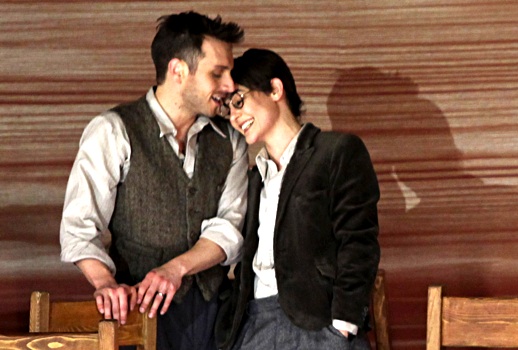

This latest visit by the acclaimed Les Arts Florissants brings Charpentier’s 1688 tragédie biblique in a devastating production from last year’s Aix-en-Provence Festival by German director Andreas Homoki who in his US debut has devised a cinematic treatment of the sometimes static work crosscutting brief mimed scenes—many in flashback—which help explain the fraught relationship of David and Jonathas, particularly the increasingly malign disapproval of Jonathas’s father Saül.
Homoki (who appeared for a bow after Wednesday’s opening) eschews nearly all of the Biblical implications of this famous story from the book of Samuel where Israel’s King Saul takes in the shepherd David after his victory over the giant Goliath but soon grows increasingly paranoid over the boy’s popularity with the people of his kingdom and incensed by his intense friendship with his son Jonathan.
He instead places the story in an insular community in unnamed place and time—vaguely Middle-Eastern in the mid-20th century—where warring factions threaten to divide the life-long friends, particularly as the bloodlust of Joabel abets Saul’s frantic delusions.
Many see David and Jonathan as the most overt same-sex relationship in the Bible, particularly in passages describing Jonathan’s feelings for David:
Now it came about when he had finished speaking to Saul that the soul of Jonathan was knit to the soul of David, and Jonathan loved him as himself. Saul took him that day and did not let him return to his father’s house. Then Jonathan made a covenant with David because he loved him as himself. Jonathan stripped himself of the robe that was on him and gave it to David, with his armor, including his sword and his bow and his belt.
and David’s grief at the death of Jonathan:
How have the mighty fallen in the midst of the battle! Jonathan is slain on your high places. I am distressed for you, my brother Jonathan; you have been very pleasant to me. Your love to me was more wonderful than the love of women. How have the mighty fallen, and the weapons of war perished!
In setting Père François Bretonneau’s libretto, Charpentier, who never married, often portrays the pair as passionate star-crossed lovers particularly in the aching duet that begins Act IV:
J: You flee from me!
D: You always follow me!
J: May I not share my grief with you?
D: See into what danger my misfortune leads you: Let us forget one another.
J: Cruel one!
D: You must be cruel too.
J: Can you be?
D: In spite of ourselves Heaven parts us.
J: Everything is being prepared against you alone.
D & J: Ah, what delights sweet peace had! Ah, was it ever necessary to rob us of the bliss of so sweet a peace?
….
D & J: I shall go; I shall seek to save the one I love.
J: Stay.
D: I cannot.
J: Alas!
D: Would you now wish to add to my torment with your tears?
At which point before David exits, Homoki has Jonathas give him a long kiss on the lips which appears to unsettle David. It’s a kiss which David is only able to reciprocate as he presses his lips to those of Jonathas now dying in his arms.
J: Despite the harshness of my fate, at least I can still tell you that I love you.
D: Heaven! Heaven! He is dead! Has so faithful and so tender a love ever had so unhappy a fate? My solicitude has not been able to protect the dearest object in my desires from a cruel death. Only Heaven could have forged such fair bonds: Alas, can Heaven take him back without me?
I recall someone once posting on another online opera forum his fervent desire to see this work staged as it would surely prove a homoerotic feast. Unfortunately that’s not really possible in quite the manner he hoped for as Jonathas is written for a soprano (sung by a boy in 1688), so Homoki’s shy, bespectacled youth was played en travesti by the fine Portuguese singer Ana Quintans whose subdued affection finally burst into a desperate fervor in that painful duet and who was particularly affecting in her stunning monologue (in a variation of the da capo form, rare for French vocal music of this time) which immediately followed that furtive kiss.
The ingenious set by Paul Zoller of looming walls of blond wood was particularly eloquent during this monologue. As Jonathas bewails his fate unable to prevent the catastrophe that will surely befall him and his friend, those walls close in on him until he can barely prevent them from crushing him. Throughout the performance the walls and ceiling expand and contract to mirror the often suffocating oppressiveness of the riven community—the only other props, a few tables and many chairs of matching wood.
If the singing rarely attained the usual fine distinction of a Les Arts Florissants performance, it may be due to the almost unbearably intense personenregie of Homoki whose characters are nearly always in extremis. Bass Neal Davies, usually such a cool, contained performer, as Saül raged frighteningly against the imagined usurpation plotting of David until he became reduced to a quivering, tortured monster, finally put out of his misery when David stabbed him in self-defense.
Having burst onto the scene over ten years ago as Ulisse in the ravishing LAF production of Monteverdi’s Il Ritorno d’Ullise in Patria, Croatian tenor Kresimir Spicer returned as the implacable Joabel whose thirst for blood drives him to murder Jonathas, an act normally kept off-stage but which Homoki instead presented with shocking vividness. Basses Frédéric Caton as Achis and Pierre Bessière as a gravely sepulchral Samuel were also splendid.
The raising of the ghost of Samuel by the Witch of Endor (La Pythonisse) was the least felicitous directorial choice by Homoki. Into his imagined scenario of the past, the director had invented the figure of Saül’s wife/Jonathas’s mother who dies onstage during one of the mimed sequences. During the opera’s prologue which Homoki provocatively placed instead after Act III, Saül comes to the Witch to help him divine the future.
During that sequence 15 or so women including La Pythonisse appear identically garbed and coiffed as Saül’s wife. Despite its fevered theatricality, this connection of the dead wife to the Witch escaped me, yet it provided a smashing opportunity for the indelible Dominique Visse to appear yet again in drag, his vividly piercing countertenor inexorably conjured the dead king whose dire prophecy of doom brought the work’s first half to its dark conclusion.
Paradoxically, the David of Charbonneau stood out as the evening’s finest, most moving achievement while also it also proved the most musically problematic. The young Québécois tenor, whom I’ve heard as an ardent Acis in Handel’s pastoral tragedy and as a most lyrical Toby in Sondheim’s Sweeney Todd, lacks the ideal haute-contre (high tenor) range for Charpentier, so on numerous occasions he struggled mightily with the high tessitura.
This role had previously been sung by countertenors such as Paul Esswood and Gérard Lesne but has more often recently been taken by haute-contres like Paul Agnew, Mark Padmore and Anders J. Dahlin. Yet Charbonneau’s singing and acting were so passionate, so committed that the musical failings paled in light of his devastating portrayal of the conflicted, reluctant hero.
Given how essential its performances in NYC have become over the past 26 years, it’s perhaps unnecessary to observe that Les Arts Florissants under its musical director William Christie was once again sublime. Although other fine orchestras now perform French operas from the late 17th and early to mid-18th centuries, LAF remains the ne plus ultra—vividly dramatic while remaining sumptuously beautiful, particularly in the ravishing prelude to Act IV.
Of particular note on Wednesday evening was the spectacular continuo team led by the supreme Béatrice Martin, clearly today’s finest exemplar of continuo harpsichord playing and also the production’s inspired chef du chant. The chorus of LAF remains unmatched performing with a radiant glow and vigorous precision I’ve never heard approached by any other group. The considerable solo singing required of chorus members in David et Jonathas was finely done, particularly by Élodie Fonnard and Reinoud van Mechelen, veterans of the 2011 Jardins des Voix.
Given the enormous expense of importing the large forces necessary for a fully staged baroque opera, who knows when the next production by Les Arts Florissants will arrive at BAM? Next year’s LAF opera, Rameau’s irresistible Platée, is being performed only in concert at Lincoln Center’s Alice Tully Hall—so anyone interested in seeing opera performed at the highest musical and dramatic level should endeavor to attend one of the remaining performances of this most powerful and poignant piece—with an audience-friendly running time of just over two-and-a-half hours, compared to Atys’s four.
For those who unable to make it to NYC this weekend where Homoki’s vision of David et Jonathas concludes its run (after performances in Aix, Edinburgh and Paris) and for those who will want to relive this superb realization, an indispensible DVD drawn from the Aix performances will be released at the end of this month.
Libretto excerpts: English translation by Derek Yeld from the libretto accompanying the Harmonia Mundi recording.


























Comments